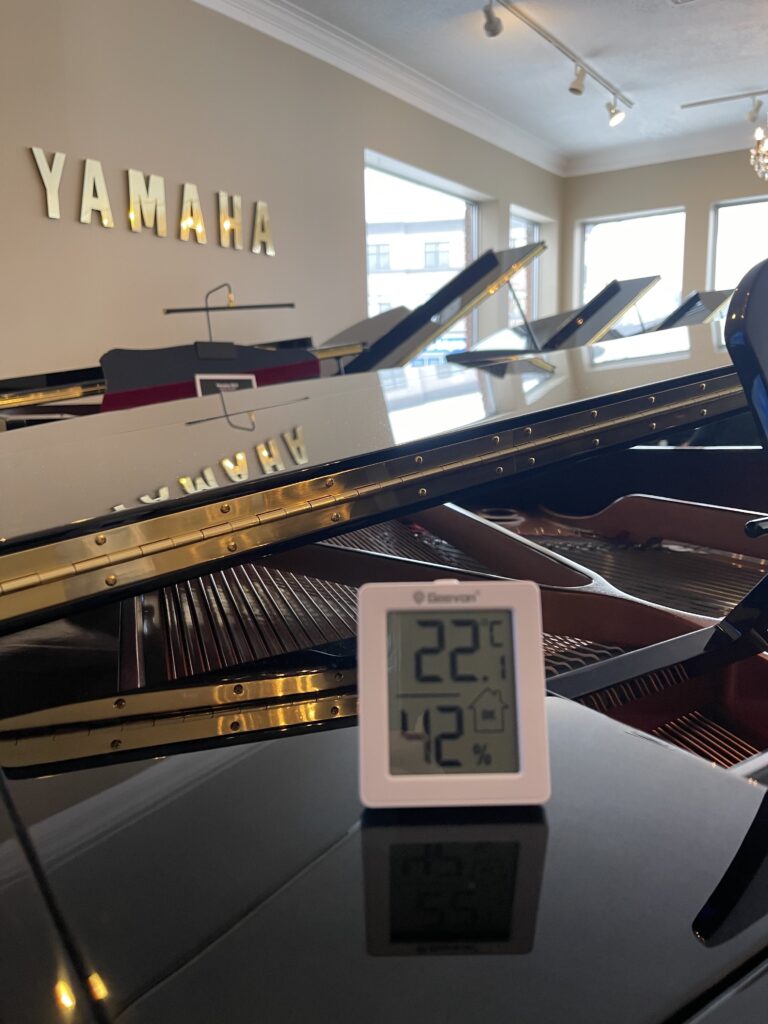Your piano isn’t just a beautiful instrument—it’s also made largely of wood, which means it’s sensitive to the environment around it. Humidity, in particular, can have a big impact. Seasonal and even daily changes in moisture levels cause wood to expand or contract. This can affect your piano’s sound, tuning, and overall condition.
If you’ve ever noticed your piano going out of tune more often or certain parts feeling different, chances are humidity is the culprit. Let’s explore how humidity impacts your piano and what you can do to protect it.
Why Does Humidity Matter for Your Piano?
Your piano’s soundboard—the large wooden piece that helps amplify the sound—plays a key role here. When humidity levels rise, the wood absorbs moisture, the crown of the soundboard expands and pushes the bridge against the strings. This increases the tension on the strings, causing the pitch to rise. When humidity drops, the opposite happens: the soundboard shrinks, tension decreases, and the pitch drops.
These fluctuations can make your piano go out of tune. Worse, if the humidity swings are extreme, they can lead to structural damage, like cracks in the wood or weakened glue joints.
What Is Relative Humidity?
Relative humidity (RH) measures how much moisture is in the air compared to the maximum amount the air can hold at a given temperature. For example, a high RH means the air is moist, while a low RH means the air is dry.
Wood, including the parts of your piano, absorbs or releases moisture depending on the RH. If the air around your piano is constantly changing from humid to dry, the wood and other materials in your piano will expand and contract repeatedly, leading to instability.
How to Protect Your Piano from Humidity
The key to keeping your piano happy and healthy is maintaining a stable humidity level. Here are some tips:
- Choose the Right Spot:Place your piano away from areas with drastic temperature changes or direct sunlight. Avoid putting it near heating vents, air conditioners, doors, or windows.
- Control Your Home’s Humidity:In many places, winters are dry while summers are humid. Use a humidifier during the dry months and a dehumidifier in the summer to keep the air more stable.
- Consider a Piano Humidity Control System:For the best results, you can install ahumidity control system directly in your piano. These systems keep the air inside your piano at an ideal humidity level (around 42%) by adding or removing moisture as needed. A technician can easily install one for you.
- Monitor Humidity Levels:A small device called a hygrometer can help you keep an eye on the humidity in your home. It’s an affordable way to prevent problems before they start.
What’s in It for You?
By keeping humidity under control, it will allow more stable tunings by reducing more radical pitch changes. Plus, you’ll prevent long-term damage to the wood, strings, and other parts. A stable environment protects your investment and ensures your piano remains a joy to play for years to come.
Think of it this way: your piano is like a living, breathing thing. Just as you’d protect a treasured piece of furniture or an heirloom, it’s worth taking care of your piano to ensure it sounds and looks its best for a lifetime.





